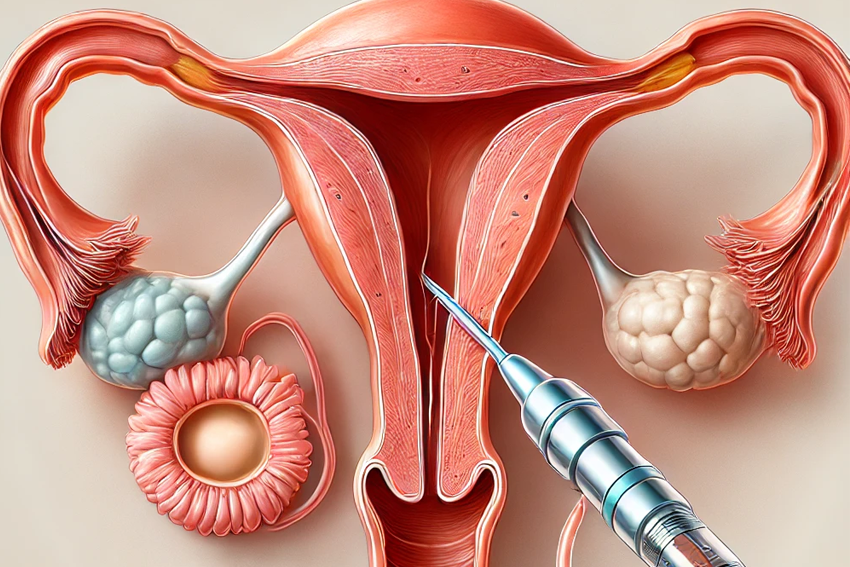Understanding Uterine Fibroids: A Couple’s Guide to Fertility, Symptoms, and Treatment
Fibroids are a common concern for many women of reproductive age. These non-cancerous (benign) growths develop in the uterus and can silently impact your life, especially if you’re trying to conceive. For couples struggling with unexplained infertility or distressing menstrual symptoms, understanding fibroids is a crucial step toward reclaiming your health and building the family you dream of.
In this blog, we’ll explore what fibroids are, how they can affect fertility and quality of life, and the personalized treatment options available—including when surgery might be the best choice.
What Are Uterine Fibroids?
Uterine fibroids, also known as leiomyomas or myomas, are benign growths that develop from the muscle tissue of the uterus. While some women may have fibroids without ever knowing, others experience symptoms that can interfere with daily life and fertility.
There are four main types of fibroids:
- Intramural fibroids: These grow within the wall of the uterus and are the most common type.
- Submucosal fibroids: Located just under the inner lining of the uterus, these can protrude into the uterine cavity and are closely linked to heavy bleeding and fertility issues.
- Subserosal fibroids: Found on the outer surface of the uterus, these can grow quite large and press on nearby organs.
- Pedunculated fibroids: These fibroids are attached to the uterus by a thin stalk and can either be subserosal or submucosal.
Each type of fibroid can affect the body differently, which is why treatment should always be personalized.
How Fibroids Affect Fertility and Pregnancy
One of the most emotional challenges couples face is difficulty conceiving—and fibroids can be an underlying cause.
- Blocked Fallopian Tubes: Large or poorly located fibroids can distort the shape of the uterus or block the fallopian tubes, preventing sperm from meeting the egg.
- Implantation Issues: Submucosal fibroids can alter the uterine lining, making it difficult for a fertilized embryo to implant.
- Increased Risk of Miscarriage: Women with certain types of fibroids are at a higher risk of early miscarriage.
- Pregnancy Complications: Even if conception occurs, fibroids can increase the chances of preterm birth, breech position, or cesarean delivery.
If you and your partner have been trying to conceive for over 6–12 months without success, it's essential to consult a fertility specialist or gynecologist who can evaluate for fibroids using ultrasound or MRI.
Common Symptoms of Uterine Fibroids
Some women never experience symptoms, but when fibroids become large or numerous, they can lead to:
- Heavy or prolonged menstrual bleeding
- Pelvic pain or pressure
- Frequent urination
- Pain during intercourse
- Constipation or bloating
- Lower back pain
These symptoms not only interfere with day-to-day comfort but can also impact mental health, relationships, and intimacy.
When Should You Consider Surgery for Fibroids?
While many fibroids can be managed with medication, surgery may be recommended in cases of:
- Severe or chronic pelvic pain
- Heavy menstrual bleeding that leads to anemia
- Infertility or repeated pregnancy loss
- Rapid growth or suspicion of malignancy (rare)
- Fibroids that distort the uterine cavity
Myomectomy is the most common fertility-preserving surgery. It involves removing fibroids while keeping the uterus intact. This is different from a hysterectomy, which removes the uterus and is usually reserved for women who do not wish to have children.
Minimally invasive techniques such as laparoscopic or hysteroscopic myomectomy offer quicker recovery and less scarring, making them ideal for women who want to conceive.
Personalized Fibroid Treatment: One Size Doesn’t Fit All
Every woman’s body—and journey—is different. That’s why treatment for uterine fibroids should be customized based on your symptoms, age, fertility goals, and the size and location of the fibroids.
Some treatment options include:
- Watchful waiting for small, asymptomatic fibroids
- Hormonal therapy to manage bleeding and shrink fibroids temporarily
- Non-surgical procedures like uterine artery embolization (UAE) for certain candidates
- Surgical removal for those desiring symptom relief or planning pregnancy
If fertility is a priority, working with a gynecologist who specializes in reproductive health is crucial.
Hope and Healing with the Right Support
Dealing with fibroids can feel isolating, especially when fertility is involved. But you are not alone—and effective, compassionate care is available. With proper diagnosis and personalized treatment, most women with fibroids go on to have healthy pregnancies and fulfilling lives.
If you're experiencing symptoms of fibroids or struggling to conceive, don’t wait. Early diagnosis can prevent complications and expand your treatment options.
Meet Dr. Durga Vytla – Expert in Women's Health and Fertility
Dr. Durga Vytla is dedicated to helping women and couples navigate complex gynecological issues with care and confidence. With advanced training in fibroid management and fertility-focused treatment plans, she provides compassionate, evidence-based care tailored to your unique needs.
Book your consultation today and take the first step toward a healthier, happier future.
Key Takeaways
- Uterine fibroids are benign but can affect fertility, menstrual health, and quality of life.
- Treatment should be personalized based on symptoms, fertility goals, and fibroid type.
- Surgery may be necessary for symptom relief or to improve pregnancy chances.
- Early intervention and expert care can make a world of difference.

